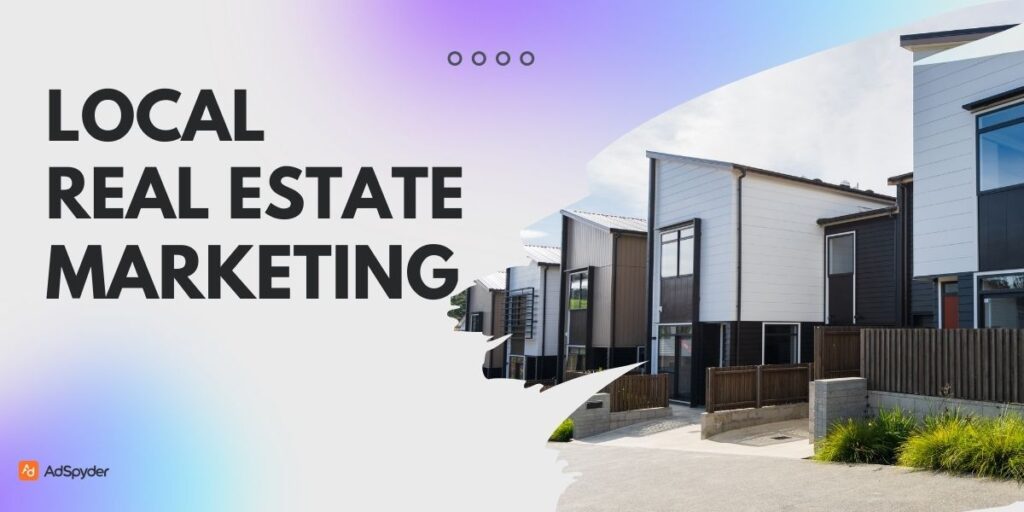The competitive nature of real estate means a successful local marketing strategy is crucial in a saturated market. National advertising campaigns can definitely have an impact, but in the end, real estate is local, and the top agents are those who have city or region-wide domination.
Ready to Elevate your Marketing Strategy?
Local real estate marketing is about reaching out to prospects and clients within a given community. It is about creating a presence in the place where you want to specialise, forming relationships with businesses in the area, and utilising online resources to attract potential customers. As a solo real estate agent or as one of a larger agency’s agents, knowing how to market yourself locally can result in increased listings, increased client loyalty, and increased commission revenues.
This manual will discuss successful local real estate marketing tactics that assist realtors in acquiring customers, building brand awareness, and turning prospects into sales. From search engine optimisation (SEO) and social media advertising to engaging in local communities and offline marketing methods, we will discuss the best ways to make yourself the top choice of real estate expert in your market.
Learning About the Local Real Estate Market

An effective local real estate marketing plan starts with a clear grasp of your target market. Every city, neighbourhood, or geographic area has distinct market conditions, buyer types, and economic forces that impact home prices and activity. As a real estate professional, keeping abreast of these factors enables you to give your clients better advice and to direct your marketing accordingly.
Researching Local Market Trends
To sell properties successfully and gain clients, real estate agents must keep track of local real estate trends, including:
- Median home prices and historical price movement.
- Inventory levels (whether the market is buyer’s or seller’s).
- Trendy neighbourhoods and potential for growth.
- Mortgage interest rates and lending trends that influence affordability.
Knowing these trends allows you to present yourself as an expert source of information and gain clients who want expert information when purchasing or selling a house.
Identifying the Appropriate Buyer and Seller Segments
Each local market possesses distinct buyer and seller segments. Certain markets may appeal to first-time homebuyers, others to luxury buyers, investors, or retirees. Determining the correct audience facilitates aligning marketing initiatives with targeting the most appropriate prospects.
For instance:
- A suburb with family-oriented characteristics can draw buyers interested in highly rated schools, parks, and safety.
- An inner-city neighbourhood might be attractive to young professionals who want nightlife, mass transit, and access to jobs.
- A beach or resort town might draw investors for rental houses or second homes.
Once you know who your target customers are, you can develop communications that address their particular pain and interests.
Related – Realtor Brand Awareness Campaigns
Positioning Yourself as the Go-To Local Realtor
In order to own your local market, you must become a go-to expert in real estate. That entails regularly giving market insights that are valuable to your audience, educating buyers and sellers, and engaging with your community.
Methods for gaining credibility in your local market include:
- Writing monthly updates on home sales, pricing activity, and investment strategies.
- Posting articles on a blog or social media about local real estate issues.
- Presenting home-purchasing seminars or seller presentations.
- Attending local networking groups and real estate panels.
As long as they view you as a source of useful information, they will think of you first when they’re ready to sell or buy a home.
Creating A Solid Local Brand For Your Real Estate Company
Branding is important in local real estate marketing. Your brand is not your logo or business card—it’s what people think of you and your services. A good brand differentiates you from others and makes you immediately recognisable in your neighbourhood.
Building a Memorable Brand Identity
To create a solid brand identity, emphasise:
- A professional and distinctive logo that symbolises your business values.
- An integrated colour palette and typography are employed on all marketing pieces.
- An engaging brand message that clarifies your expertise and purpose.
To illustrate, a real estate agent who handles high-end waterfront properties may have a brand identity expressing refinement, selectivity, and high-end service, whereas an agent who handles first-time buyers may develop a brand that’s welcoming, informative, and easy to engage with.
Developing a Consistent Marketing Message
Your marketing message must be aligned with your values, expertise, and target market needs. Your message must directly convey:
- What are you about, and what area of specialisation?
- Why are you different from your competition among local realtors?
- How do you work to get sellers and buyers exactly what they are looking for in the real estate market?
For instance, if your central focus is assisting families in acquiring their ideal homes, your messaging must foreground neighbourhood amenities, school districts, and family-oriented neighbourhoods. If your speciality is assisting sellers in realising the greatest value from their home, your messaging must foreground expert staging, pricing, and negotiation.
Creating Social Proof With Testimonials and Success Stories
Trust is the most significant aspect of real estate transactions. Testimonials and success stories are social proof that creates confidence among potential buyers and sellers.
Methods for presenting testimonials include:
- Displaying good client feedback on your website and social media profiles.
- Developing video testimonials in which happy clients narrate their experiences.
- By utilising before-and-after case studies to illustrate how you assisted clients in successfully selling or purchasing their properties.
When potential clients view actual testimonials of successful buyers and sellers, they become more confident in your handling of their real estate transactions.
Online Marketing Strategies for Local Real Estate

Online marketing is also important in reaching local buyers and sellers efficiently. With the proper online strategies, real estate agents can generate more leads, establish credibility, and expand their business.
Maximising Google My Business (GMB) for Local SEO
Google My Business (GMB) is a free yet effective tool for making real estate agents show up in local searches and Google Maps. An efficiently optimised GMB profile makes agents more visible whenever individuals search for realtors or houses in the vicinity.
To make your GMB listing optimal:
- Make sure your business name, address, and phone number (NAP) are accurate and the same.
- Include good quality photos of you, your workplace, and sold properties.
- Urge clients to post positive feedback, as this increases credibility.
- Post regularly about new listings, market conditions, and happenings.
Harnessing Social Media for Reaching Local Communities
Social media sites such as Facebook, Instagram, and LinkedIn are great for reaching local buyers and sellers. To achieve a robust presence:
- Post new listings, virtual tours of homes, and open houses.
- Post market news and neighbourhood information.
- Conduct live Q&A sessions to respond to real estate queries.
- Join the community by commenting and reposting local news stories and events.
Regularly publishing relevant, interesting content keeps you at the forefront of minds when consumers are considering buying or selling a house.
Check Out – Proven Paid Advertising Strategies for Real Estate Agents
Operating Targeted Google and Facebook Ads
Paid advertising can be a very effective means of reaching prospective clients in your target market. Google Ads and Facebook Ads enable real estate professionals to:
- Target specific neighbourhoods, ages, and income levels.
- Retarget website visitors with targeted property suggestions.
- Drive high-quality leads through call-to-action ads such as “Schedule a Consultation”.
Through data-driven advertising, real estate agents can target serious buyers and sellers instead of mere browsers.
Offline Marketing Strategies to Enhance Local Presence
While online marketing is crucial for lead generation, offline marketing is a valuable means to establish local brand presence and touch potential clients at a personal level. Offline efforts, coupled with online efforts, can make an effective local presence that establishes a real estate expert as a reputable authority in the community.
Sponsorship of Open Houses, Community Events, and Home Purchase Seminars
Having open houses is among the most powerful offline real estate marketing methods for real estate agents. Open houses draw in potential sellers and buyers, providing them with the opportunity to personally meet the agent, pose questions, and view the house itself. Even though attendees are not looking to buy for themselves, they can refer a friend or family member who does.
Another effective offline marketing tactic is to sponsor community events or home purchasing seminars. These seminars inform prospective buyers about the real estate process, financing, and market conditions. By becoming a trusted resource, you build credibility and rapport with future customers.
For instance, organising a “First-Time Homebuyer Workshop” at a community centre or library can draw those interested in purchasing but uncertain or hesitant about how to go about it. Free advice, mortgage counselling, and Q&A sessions are likely to build confidence and create leads for forthcoming deals.
Collaborating with Local Businesses for Cross-Promotion
Real estate agents can reach more people by teaming up with local companies that share the same niche. For instance, teaming up with home inspectors, mortgage brokers, interior designers, and moving companies is a win-win situation where both firms refer customers to each other.
Some good partnership concepts are:
- Developing a referral program wherein companies refer your services to customers.
- Providing special discounts to customers who avail of both services (i.e., homebuyers get a discount on home interior designing services when they buy a property through you).
- Joint organising of events or webinars on buying a home, financing a home, or home remodelling.
These affiliations assist in creating solid local connections and can generate future referrals as well as greater credibility within the neighbourhood.
Applying Direct Mail Marketing to Hyper-Local Targeting
Even with the growth of digital marketing, direct mail still has significant appeal for local sellers and buyers. Flyers, postcards, and newsletters enable real estate agents to promote their brand, recent sales, and upcoming listings directly to homeowners within a local area.
Among the most successful direct mail campaigns are:
- “Just Sold” postcards showcase recent successful sales.
- “Market Update” newsletters report on home prices and trends.
- “Exclusive Listings” flyers on new homes available for sale.
- Personalised letters asking homeowners to have a free property valuation.
Personalisation sparks engagement, and talking to homeowners in their names and including neighbourhood market information enhances the campaign’s effectiveness.
Sponsoring Sports Teams, Schools, and Community Events
Sponsoring a local event, school, or sports team is an excellent means of raising brand awareness while contributing to the community. With sponsoring a youth soccer team, a charity fundraiser, or a school event can help real estate agents build positive connections with their brand and establish relationships with potential clients.
Placing a real estate banner at the local high school football game or a logo on a local charity run shirt guarantees that individuals in the community see and remember the agent’s name when they become ready to sell or purchase.
Local SEO Strategies for Ranking Higher on Search Engine Results

Local SEO plays a critical role in making real estate professionals rank high on search results when potential buyers and sellers search for homes in their localities. A properly optimised website and online presence can bring organic traffic and quality leads.
Utilising Localised Keywords to Enhance Search Rankings
Local keywords assist search engines in determining where an agent works and matching them with local searchers. Rather than being competitive, broad keywords such as “real estate agent” and employing more descriptive phrases like “best realtor in [city]” or “homes for sale in [neighbourhood]” improve visibility on local searches.
For instance, a real estate agent who specialises in Austin, Texas home sales should have their website search engine optimised for the following phrases:
- “Homes for sale in Austin TX”
- “Real Estate Trends of Austin”
- “Locate a Real Estate Agent in Austin”
These keywords must be reflected in web copy, blog post titles, page titles and meta descriptions to enhance local search rankings.
Encouraging Clients to Leave Google Reviews
Positive Google Reviews Positive Google reviews are a significant factor when it comes to ranking in local searches. Testimonials are the social proof that an agent is trustworthy, and make happier customers more likely to close a sale!
To improve the review, agents can:
- After a successful deal, politely request that happy clients leave you a Google review.
- Make it easy by providing a link for them to leave a review.
- Reply to all reviews, regardless of whether they’re positive or negative, to demonstrate engagement.
For instance, following the closure of a sale, an agent can send a message as follows:
“Thank you for entrusting me with your home buy! If you have a second, I’d really appreciate it if you left us some feedback on Google”.
Listing on Real Estate Directories and Local Business Listings
The real estate industry must list its business on all reputable directories, which helps in improving local SEO rankings. A Realtor listing regularly appears on platforms like Realtor. com, Zillow, Yelp, Facebook Business, it helps improve your online visibility.
Each listing should include:
- A professional, keyword-loaded business description with local focus, and the link (pointing to the homepage).
- Real contact info (name, phone number, address).
- Professional images of listings and the agent’s team.
Consistency is key, regardless of the platform. Companies that have a consistent Name, Address, and Phone Number (NAP) will generally rank higher in Google.
Recommended For You – Real Estate Lead Generation Ads
Using Video Marketing to Reach Local Success in Real Estate
The use of video marketing has become crucial for real estate agents who want to differentiate themselves in today’s competitive market. Video content is more interactive, shareable, and memorable than still images or text posts.
Appealing to Local Buyers with Virtual Home Tours
The majority of virtual home tours enable potential buyers to visit a property without leaving their homes. These videos offer an immersive view that can help prospective buyers hold a vision of the space, and are then more likely to book a visit.
The quality of virtual tours is ideal if they:
- Showcase what’s noteworthy about the space (kitchen, living room, backyard).
- Add a voiceover or some text to describe the house.
- Be filmed and edited professionally for maximum quality.
Shooting Community Clips for The Local Area
One way real estate agents can market homes is by putting together neighbourhood highlight videos that might draw buyers looking in certain regions. These videos should feature:
- Prominent eateries, parks and entertainment venues.
- Schools, transit and amenities.
- Residents’ viewpoints on what makes the neighbourhood lovable.
Conducting Live Q&A on Social Media
Facilitating live real estate Q&A sessions via Facebook, Instagram, or YouTube is a fantastic way for real estate agents to engage their audience live. Agents can respond to frequently asked home-buying or selling questions, provide market updates and present new listings.
Live enablement sessions build trust and establish the agent as an informed local expert. They also prompt immediate interaction, as prospective clients can ask questions and receive instant responses.
Common Mistakes to Avoid in Local Real Estate Marketing
Although most real estate pros work very hard to promote their services, some errors can block their progress. By identifying and sidestepping these typical errors, real estate professionals can also fine-tune marketing approaches and see better returns.
Ignorance of Digital Marketing and Dependence on Traditional Marketing only
A lot of real estate agents continue to use traditional marketing efforts (newspaper ads, fliers, cold calling, etc.) and don’t see new value in digital marketing. Offline is good, but you’ve got to have an online strategy, as offline is quite limited when it comes to visibility.
Buyers and sellers are relying more and more on Google, social media and real estate websites to locate listings and agents. Agents who do not develop an online presence stand to lose out on a significant proportion of their potential customer pool.
Not Being Consistent with Your Brand Personality
A solid real estate brand creates trust and credibility, while inconsistencies create confusion among potential clients. There are agents that don’t have a cohesive brand identity when it comes to various channels, so they become forgettable.
For instance, an agent might have a certain branding, messaging on their website and a totally another Facebook page. This discrepancy doesn’t allow names to be associated with them, which makes them seem difficult to recognise and remember by clients.
To prevent this, promotional materials use the same logo, colour scheme, messaging, and style from one platform to the next. The result is that when they find a potential lead accessing that content, they are able to disassociate the two.
Failing to Embrace the Local Community
We see a lot of real estate agents with advertising, but they don’t do anything in their community. Clients want to know that an agent makes connections and cares about the community.
Here are some ways to increase local engagement:
- Community and networking events.
- Sponsoring or partnering with local businesses.
- Attending charity events and supporting local events.
Agents who invest the time to position themselves as involved members of their communities earn credibility and referrals for years to come.
Underestimating the Value of Reviews and Testimonials
Reviews and Testimonials Available online, reviews and testimonials can also help sway a decision of a buyer/seller towards that realtor. A lot of agents don’t have a process that effectively gets former clients to write reviews for them, and in doing so, they’re leaving a great deal of trust-building on the table.
Agents can approach satisfied customers to generate reviews on Google My Business, Zillow and Facebook. Good reviews instil trust and promote better local search exposure. Furthermore, other potential clients could be drawn to such credibility and hearing other clients’ testimony via video or text-based content.
No Monitoring or Analysing Marketing Performance
One of the worst mistakes in real estate advertising is not measuring the results of your marketing campaigns. Without data, agents don’t know whether a strategy is working or needs to be enhanced.
To prevent this, real estate agents must:
- Monitor and track the traffic and visitors’ behaviour on your site with the Google Analytics tool.
- Track the success of your ads on Facebook, Instagram and Google Ads.
- Dive into open rates and click rates for email marketing. (e.g. confirmed sales data), instead of hunches.
Tracking the performance and data-based campaign optimisation by agents can result in greater efficiency and better results with leads.
Maximising and Scaling Local Real Estate Marketing Initiatives

Once a local real estate marketing plan is working, it’s time to refine and scale things up to attract a larger audience and produce more leads.
Increasing Reach through More Digital Ad Campaigns
The estate agents who have also been successful with their ads on Agency Bay, with Google Ads, Facebook Ads and Instagram, should scale the advertising budget.
Here are a few tactics for ensuring that ad campaigns are running in top form and working to make the most of budgets:
- Testing different ad creatives, messaging, and targeting variations with A/B tests.
- You could widen the geo-target area to include neighbouring blocks.
- Show targeted ads to visitors who have previously engaged with listings but not converted.
By spending more on advertising in top-performing areas, agents can pull in more serious buyers and sellers and expand their local business.
Making More Content for The Community
Scaling local marketing efforts isn’t necessarily about spending more money — it’s also about creating valuable, community-driven content that will get high engagement.
Here are some community-oriented article ideas:
- Neighbourhood highlights that fit the things that matter to you (like schools, restaurants, parks, and entertainment).
- Monthly market reports on local real estate trends.
- Advice on buying and selling in the local market.
The more you position yourself as a resource of information, the more organic leads you will attract over time.
Developing an Organic Referral Network
It’s hard to beat free, and marketing at scale means not always spending more on ads, when building word of mouth referrals can take your business to the next level.
Some of the ways to increase referrals are:
- Referral program in which previous clients are incentivised to refer an agent’s services to others.
- Working with mortgage brokers, home inspectors and moving companies to exchange referrals.
- Utilising broadcast emails and social media to maintain regular communication with old clients and stay top-of-mind.
Real estate professionals can employ their current relationships to grow their business organically and sustainably.
Must See – Google Ads for Home Sales
Frequently Asked Questions (FAQs) About Local Real Estate Marketing
How long does local real estate marketing take to produce results?
Results can be seen within weeks and also months , depending on the marketing method utilised. Some digital tactics can deliver leads in days or weeks, such as Google Ads and Facebook Ads. But efforts toward SEO and brand-building can take months to yield any visible returns.
How to Lead for Local Real Estate?
It all depends on the lead generation strategy that best fits your audience. For buyers, digital marketing tactics including Google Ads, SEO and social media engagements are effective. Sellers can get a lot of mileage from direct mail campaigns, community engagement and referral marketing.
Do I need to put more attention to the social or SEO when marketing for local real estate?
Having a presence on social media makes it easy to nurture relationships and engage with local markets. SEO enables agents to be discovered in search results when buyers and sellers are actively seeking properties. In best-case scenario, Real Estate agents would need to concentrate on both for a comprehensive marketing plan.
What should be my budget for local real estate marketing?
The line-by-line budget for local real estate marketing is simple. The local real estate marketing budget depends on your business goals.
How can I stand out among other local realtors?
- Focus on a niche like luxury homes, first-time home buyers, and investment properties.
- Provide outstanding customer service and hyper-personalised experiences.
- Establish credibility through content marketing and community engagement.
Conclusion
Local real estate marketing that works. As a local business looking to grow, finding your own way to stand out is critical as well as necessary. Business is booming in hot real estate markets, with available inventory dwindling and prices soaring in some markets. Through SEO, social media, community engagement, digital ads and relationship building, real estate agents can establish a sustainable long-term marketing plan that actually produces results.




